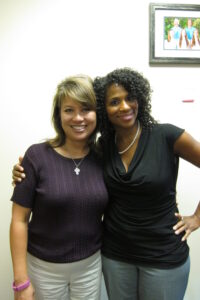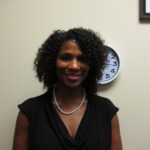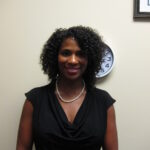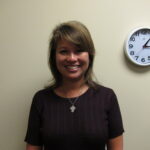Susana Alfonso and Cory Hall
Description
Dr. Susana Alfonso (47) shares her insights about her profession and memories of a few patient stories.Participants
- Susana Alfonso
- Cory Hall
Venue / Recording Kit
Tier
Partnership
Partnership Type
OutreachInitiatives
Transcript
StoryCorps uses Google Cloud Speech-to-Text and Natural Language API to provide machine-generated transcripts. Transcripts have not been checked for accuracy and may contain errors. Learn more about our FAQs through our Help Center or do not hesitate to get in touch with us if you have any questions.
00:00 All right, I am.
00:03 My name is Cory Hall. I'm 42. Today's date is September 16th, 2015. We're recording at the Dunwoody Family Medicine Clinic with Emory Clinic and I am recording with dr. Alfonso.
00:20 And I'm dr. Susana Alfonso, my age is 47 today's date is September 17th or locating at Emory where located at Emory family medicine and Dunwoody, Georgia?
00:37 Dr. Alfonso, thank you so much for joining us today to have a conversation. How would you like to begin?
00:45 Well, so thanks for having me. I will talk a little bit about my what I do and then I'd like to tell you about a few patients that I met early on in my career that really impacted the way I take care of patients in the way. I see health care and Health Care provision. So I'm a family physician and I graduated from medical school in 1996. I was home for a year taking care of my newborn son. And then I started residency training at Emory Family Medicine in Atlanta and I grew up in Atlanta while although I was born in Ecuador in South America and raised in Atlanta.
01:31 I felt like I was a native of Atlanta but really quickly after I began my residency training. I realized there was a whole side of Atlanta and a whole population of patients in Atlanta that I've never come across in my life. And there were places in Atlanta that I had never been when I started my residency training and the nurses at the clinic where I practiced because I got lost for the first week or like warrants aren't you from Atlanta, but I had never been to this part of Atlanta or seeing the patients or the population that I was not working with.
02:06 I'm so if you talk to any doctors, they will all tell you that intern year is a tough year. It is a tough year physically emotionally intellectually and spiritually it tests everything about who you are.
02:27 Because you're first of all learning so many things all at once you have an amount of responsibility thrust on you from one day to the next that you really don't understand until you're in it. It's very scary and you're often times put in situations where you're it, you know, they say there's sort of a joke that on June 30th you go from being a student and July 1st, you go to being the doctor and sometimes you're the only person you are the person that's taking care of the patient. And so one of my most powerful memories from my intern year was being on call down at Emory University Hospital Midtown, which is a very Urban hospital that takes care of a typical Urban population of patients and I had been on call
03:18 Every third or fourth night for
03:22 Many many months. Wow, I was exhausted since that time some rules have changed around residency training and some of those practices don't occur as much anymore. But so this woman came in she was brought into the emergency department and she was had hepatitis C and she was an alcoholic and an IV drug abuser and she had end-stage liver disease. And so and the reason that she was brought in is because she had what's called an upper GI bleed and wanted to basically she was bleeding from her stomach and she was basically vomiting blood everywhere. Wow, and someone like that has a very high risk of having HIV and this is in the 90s and it was scary. She was because she had liver failure.
04:22 She had she was out of her mind and she had what's called hepatic encephalopathy, which basically means that all the toxins that are liver can metabolize anymore are going to her brain. And so she was literally out of her mind literally and you know just spewing blood all over that the room and I went down to see her and I was frankly disgusted by her and I was disgusted and I was angry that I was having to deal with this literally putting my life at risk because she was so infectious and and if x is with what we knew we were concerned that she was infected with other things that we didn't know back then we were just learning to understand HIV
05:07 And I
05:10 I examined her as best I could and I wrote orders for her to be admitted to the hospital and the nurses were struggling with her because she was thrashing about and I remember turning to the nurses and saying to them tie her up.
05:28 And sedate her and tie her up, and I remember thinking that she was like an animal.
05:36 And I went to bed and she got better because we started giving her medicine and you know, she did get sedated and you know, she was stabilized overnight and then the next morning it was probably really wet the next morning. It was like 3 hours later about 6 in the morning. I went in to see her before we had rounds.
05:59 And I knocked on the door and I walked in and there was a woman who was sitting up in her bed wearing silky pajamas and she had all of her perfumes toothbrush all lined up on the on the sink and she looked me and she said hi there. Who are you?
06:21 And I realized that she was not an animal at all. And she said that she was a human he had no idea what she had done the night before she had no idea how sick she was and she was just like me would have been like I would have been in a hospital with my silky pajamas arranging my toiletries and asking what's going on and I learned a huge lesson about people and how
06:52 You know about judgment and II it really taught me a lesson of you know, when people are sick. They're sick. They're their mind body and soul are sick. And that's not the time that we should judge them. Absolutely and it still is scary Amina. I was still scared, you know, but that didn't give me the right to think of her as anything other than what she was which was a sick lady right? Wow, yam. So that was 1997 Soul 18 years ago and I still remember her face. I can't remember her name, but I remember her face. So did she have any recollection the following day so she was literally out of her mind. Wow. I've never seen you before who are you? Wow.
07:42 I have to be very humbling. I think the next day to to realize what you had what you saw the night before and then this person that you saw the next day realizing this is actually the same person but just in a different state of mind and on a journey to health and how when we're sick, we're not ourselves. That's right. Yeah, that's exactly right thing was said is that it really drove home for me that we are we are obligated to help folks when they are at their lowest, you know, it is we take care of patient. I I work mostly in the outpatient setting and you know, seeing patients when they're doing well is awesome. Great. It's wonderful. You feel good. I feel good. But really when they need us is when they're not doing great. And that's when we have to really hold ourselves together pull from other resources.
08:43 To be able to give the care of the patients need from us. What do those other resources look like?
08:50 Well, I think that as Physicians we do a really bad job of this. I think that is Physicians. We don't use our other resources like our taking care of our emotional or spiritual health our physical health. We don't exercise the way we should we don't attend to the things that are hurting our spirit like specifically stressors, you know, if we don't if we don't get with her own stressors and manage our own stressors, you know that the evidence is very clear Physicians are at much higher risk of taking drugs without a prescription of abusing alcohol and abusing certain sites certain types of drugs of becoming quote-unquote impaired.
09:39 And as a community were not very good at policing each other in terms of when you see a colleague who is impaired whether it's by stress or addiction or other or or or a physical ailment even
09:55 One of the biggest blessings in my life has been having a partner that is not in medicine because he and I are we were married before I started medical school. So he has walked this whole journey with me and he's so many times really kept me grounded as to you know medicine is not really focused on what's good for you meaning me as a doctor. It's really about what's best for the patient and he's really helped me stay grounded with that. That's awesome.
10:33 So the next person I'd like to tell you about so that patient really taught me about making sure that we always see our patience has people because I think sometimes is doctors we end up seeing patients as disease entities patient with dka in room 6 the next patient taught me about making assumptions. Okay, we all go into life. We carry our baggage. I'm a mother and a wife and a sister and the oldest of my siblings and all those things. You know, I'm from Ecuadorian descent and all those things sort of roll up and and are part of my culture and who I am and so I took care of a young man as a resident as well who had Advanced HIV
11:25 And he had this awful awful diarrhea and was losing weight and he was stable from a medical perspective, but we couldn't get him a good disposition and he had a mom who was willing to take care of him and he didn't want to go to her. He wanted us to place him in another living facility and I remember it being so frustrated with him and being like why you know, here's your mom was willing to take care of you. You know, you have all these medical problems. He was essentially incontinent. So he required, you know diaper changes that occur as an adult and and I thought God hears your mom if she's willing to take care of you and why you know, you ungrateful, son. Why don't you go home with her and so
12:17 He ended up going home with his mom and I got a call probably two or three weeks later that he had passed away and he was found in his room in his house where he had been for at least 48 Hours unattended and his mom we found out was actually taking pain medications.
12:44 When was a drug addict so that was the reason he didn't want to? Yeah, but he never told me that he never even said I suspect this. He must have known he probably didn't want to shame her. Right? Yeah, and I remember getting the news I was at the residency training site without which is doesn't the building no longer exists, but oddly enough one of the nurses that I work with today was my nurse then wow, her name is Brenda and I actually asked her recently. She remembered the story. She said she didn't but I remember because when they told me I was in the middle of clinic and I just put my head down and cried on the table and she's so protective. She was like, okay everybody back off a minute, but it taught me about assumptions and about our own baggage and it's hard not to bring your own baggage in but we do
13:43 So I learned a big lesson that day as well and so went when you when you take us back to to Brenda because I'd I know Brenda right but you were going to Clinic with you. I think that's a really good descriptive or to use of her protective. Does she still protect you in that same way today?
14:06 Because cuz you're a big girl now, right but I bet you that if you ask the residents that work with her that they would tell you that she protects them. Yeah. Yeah. I have no doubt in my mind. Yeah, she's great. Yes. Wow, that's a great story.
14:26 So the last patient I want to talk about is a patient. I actually saw today. Okay. I've been taking care of her for more than 10 years.
14:37 And this was an this is another story of assumptions in this country mental illness still carry certain stigmas. Yes, and
14:51 There are some folks that it is hard. So it is easy to see if someone has a cut that's bleeding on someone's arm, but there's a problem right? It's harder to see a mental illness as a problem because you can't see it. You can't measure it. There's not a blood test and I've had many times patients who had mental illness and the stigma of having it at the the difficulty of diagnosing it the stigma of treatment that is sometimes perceived by them always reminds me of this particular patient who has struggled with severe severe depression for the whole time. I've had her
15:38 And she has been hospitalized.
15:44 More than 25 times for suicidal attempts. She has had every therapy known that we could possibly think of including electroconvulsive therapy, which is not very widely used anymore, but it's been tried on her because she's got such severe severe debilitating depression.
16:08 And
16:10 What speaks to me about her is?
16:15 It just reminds me like it reminded me today. She came in with a suicidal gesture. She had taken many pills before coming to this office and
16:29 It was a cry for help and you know my fear of
16:37 Getting a call one day and hearing that she's taking her life. I think about it. Every time I see her on my schedule. I'm I breathe a little sigh of relief because I think okay. She still here. She still here. Yeah and knowing that just like many other chronic illnesses. We really can't fix it for her. Right but just like many other chronic illnesses. It's really devastating to her life and in her case it it interferes with her ability to work it interferes with our ability to have relationships now, you know, it interferes with her ability to have a relationship with her family or have a life partner. Does she have children?
17:17 Well now this is his really consumed her life Wow, and we have very very little to offer her today when the ambulance was picking her up. You know, she just gave me a very forlorn look me know when she left and I just said look, you know, we'll get you the emergency department then we'll get you into the mental health hospital and then I'll see you in two weeks.
17:46 And I was in my way trying to tell her, you know, don't lose hope right, right.
17:53 But but I worry I worry every time is this going to be the last time I see her so and I think sometimes in medicine we we try to fix things, you know and Somme for so many things and actually for a growing body of disease states. There are no cures are burden of chronic disease management is just getting bigger not smaller and the tools that we have in our tool box or the tools.
18:24 That really will make differences and fucks a chronic illnesses.
18:32 I don't know. How does it make you feel to treat someone for 10 years and and to know that every time you treat them you're wondering if you're going to see them again. How does that affect you personally?
18:43 Well, you know I am.
18:47 I pray a lot when I take care of patients because I think that I'm very grateful that I feel like I have a big brain and I learned all the science and the medicine and the drugs and then but I pray for grace.
19:02 They have a strong faith-based life.
19:06 Is that what gets you through day today? Yeah.
19:10 I know that sometimes.
19:14 Sometimes the things I can give patients aren't really about medicine.
19:21 Now I just the thing that I pray for is that
19:26 Medicine is very it's very tough. There's a lot of changes. There's a lot of computers. There's a lot of codes and sometimes when you are
19:39 Balancing all those things and making sure that your dot your I's and cross your t's
19:44 My fear is that I will get wrapped up in all those things and then I will have missed someone that really just needed me to be prayer hands and be present to put my computer down. So I just hope and pray that at the end of every day that I can that I haven't missed any of those patients, you know, well that would be devastating for me.
20:09 I can attest that based on the comments that your patients send in about you when we send out these random surveys that if I had to say do your patients feel like you seen them? Yes they do and that you're not you're not blind it behind the equipment and the technology of medicine today that you're still very present a very human with your patience and I've read enough voices of your patients to know how much that makes a difference in the way that you make them feel less people. So going back to the first or that you share with us, you know, I think you you make your patients feel like she sees me individually as a human and that's what you're treating not the disease not the sickness or saying that Corey. I really I really do try because I just I feel like they need medicine. They need Specialists. They need procedures. They need test and all this but
21:10 But I really also know because I've been on the other side that
21:15 That sometimes the thing that makes the the extra difference is that they need to be seen as human. I need to be seen as people and they need kindness. So I hope that the end that's really what I pray for. I pray for that. I just am able to balance those two things because we can't not document the visits or reconcile the medication of those things are important and they are for patient safety and many other reasons.
21:46 I just worry that sometimes when we have these other things that we get involved in that it just will take us away from you know, putting down the pen looking at someone and end and connecting with them.
22:02 How do you guide and encourage the residents particularly the first year residents to be able to navigate that landscape in the way that Healthcare is changed so much since you were first resident, what words of encouragement of War?
22:16 Feedback and input to give them to help them to get to that place of seeing the patient. Well, I I tried to force of all lead by example.
22:25 And when I'm having a rough day, you know, I let them see it. I talk to them about it. I talk to the nurses about it afterward. I say I flat-out said look, I know I had a rough morning and this is why you know this this this scares me. This upsets me. This makes me angry. I encourage them to take care of themselves have outlets and have resources and if they are in the moment, I asked them to please remove themselves from the situation so that they can quote pull themselves together because it's not okay for the patients to come in and no
23:07 That you were having a bad day or that you were angry or upset. You know, I mean, I think sometimes the patients can sense if folks are frustrated. Like when we went to our recent provider optimization, it was obvious that we were frustrated and it was obvious if we were struggling and I you and I talked about this that we felt like the best strategy is to just say to the patient's look we're having this thing going on right now bear with us and I think they appreciate it that right because it was transparent right? So I just I hope that I provide as a leader a safe environment for people to for providers to be human and for providers to learn how to deal with other people that are human piano.
23:58 I think of them all the time I'm like you can make diagnosis and give prescriptions to your blue in the face. But if you don't connect with people you will not help them and be a Healer.
24:13 Hopefully you hear that.
24:17 Alfonso thank you so much for sharing with us today. I wasn't an amazing Stories. Thanks. Thanks. Thank you.







